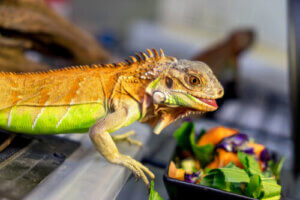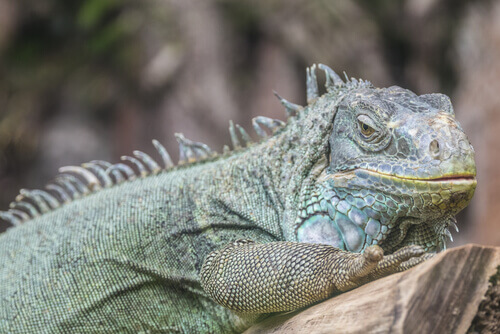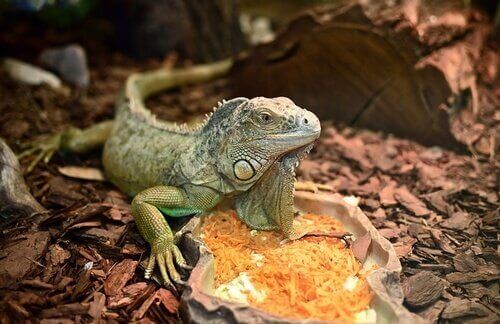The Iguana's Diet and Its Importance to its Health

Among exotic pets, the green iguana and its closest relatives have been the most successful. As with other exotic animals, the iguana’s diet is a vital part of its health, and mistakes in its diet are one of the greatest triggers of disease.
The iguana’s diet is strictly vegetarian
This is the first and most important point. If we’re going to have an iguana as a pet, we should know that this animal is strictly vegetarian. It doesn’t need chicken, cooked ham, or any supplement of animal origin.
They don’t need insects either as is the case with other reptile species. And we should never resort to canned food for cats or dogs. Iguanas eat vegetables and their intestines can’t assimilate animal protein.
Calcium and vitamin D, vital in the iguana’s diet
It’s true that sometimes the iguana’s diet can include supplements. Calcium is especially important in order to avoid diseases such as metabolic bone disease.
It’s difficult to meet the calcium needs of these reptiles without supplements, only based on a natural diet. However, this calcium that we include in the diet must be assimilated thanks to vitamin D.

This is why iguanas require exposure to the sun or at least one UVB emitter – this is especially important if we’re going to breed iguanas.
What foods should the iguana’s diet include?
First of all, the ideal food in the iguana’s diet is should have a high concentration of calcium, such as dandelion, alfalfa or clover. As we said, it’s often necessary to use supplements as well, but the ideal thing is to consult a vet specialized in exotic pets.
It’s necessary to use a diet rich in healthy proteins. Therefore, we recommend romaine lettuce, alfalfa, cabbage and clover as good sources of protein for the iguana’s diet.
Even if most iguanas are reluctant to eat food that isn’t fresh, the use of alfalfa hay may be useful in order to increase the amount of fiber in the diet. We can try to introduce a small percentage of hay to the fresh food, and adapt the percentage to the preference of our iguana.
Apart from this, vegetables like carrot, chard, endive, or beet are also recommended. We can also include small quantities of potatoes, zucchini, beans or some fruit. The fruit, however, shouldn’t exceed 15% of the diet: tomato, melon, or apple, for example.

Non-recommended foods
Even if they can be part of the iguana’s diet, there are foods rich in oxalates such as spinach, cabbage, peas, and beet leaves. Therefore, they must appear sporadically in its diet.
In the case of kale, cabbage, and mustard leaves, they contain elements that can affect the thyroid function. So, they should also appear only occasionally in the iguana’s diet. None of these elements are excessively toxic, and some, like kale or mustard, have good nutritional characteristics, but they can’t form the basis of the diet.
Water and dry food, critical aspects of the iguana’s diet
Hydration is especially important in reptiles due to the fragility of their kidneys. That’s why water is very important in the basic care of an iguana. It must be taken into account in the humidity of the terrarium as well as in the amounts of food and water.
The issue of providing water to these animals should be of vital importance in the case of iguanas that consume pellet food. While salad-based diets contain a large percentage of water, feeds hardly contain any.
That’s why pellet food is only recommended as a supplement, especially the one high in calcium. Dry diets based only on feed or pellets can be dangerous for the iguanas.
Be careful with the temperature
Temperature is something we must take into account when we want to keep reptiles in good condition. But it’s also closely related to their appetite, as in cold conditions iguanas hardly eat anything.
So, if we see that the iguana has lost its appetite, we should check the conditions of the terrarium. We must pay special attention to the temperature and humidity the animal is used to.
This text is provided for informational purposes only and does not replace consultation with a professional. If in doubt, consult your specialist.